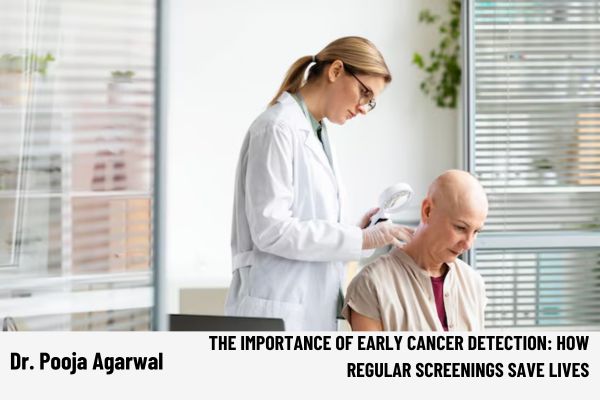The Importance of Early Cancer Detection: How Regular Screenings Save Lives | Dr. Pooja Agarwal
Cancer remains one of the leading causes of death worldwide, but advancements in medical technology have brought about significant improvements in early diagnosis and treatment. Early cancer detection is critical for increasing survival rates and improving treatment outcomes. Regular screenings are an essential tool in identifying cancer at its earliest stages, when treatment is most effective.
Dr. Pooja Agarwal, a leading cancer specialist, emphasizes the life-saving potential of early cancer detection and the key role that regular screenings play in identifying cancer before it advances. In this blog, we’ll explore why early cancer detection is so crucial and how regular screenings can make a significant difference in saving lives.
Why Early Cancer Detection is Crucial
Cancer develops gradually, often without noticeable symptoms in its early stages. If left undetected, it can grow and spread to other parts of the body, making treatment more complex and less effective. By detecting cancer early, however, the chances of successful treatment increase significantly. Here’s why early detection matters:
- Improved Prognosis: The earlier cancer is diagnosed, the higher the chance of successful treatment. When cancer is detected in its early stages, it is often localized and has not yet spread to other organs, making it easier to treat. Early detection increases the survival rate and improves the overall quality of life for patients.
- More Treatment Options: Early-stage cancer often requires less invasive treatments, such as surgery or targeted therapies, which have a higher success rate. The earlier the cancer is caught, the more treatment options are available, giving patients a wider range of possibilities for managing the disease.
- Lower Treatment Costs: Treating cancer at an early stage is generally less expensive than treating more advanced cancer. Early interventions are less invasive and require fewer resources, thus lowering the overall cost of care. The financial burden is significantly reduced when cancer is detected and treated early.
- Fewer Complications: Early detection often leads to fewer complications. As cancer spreads, it can affect other parts of the body, leading to more complex and difficult treatments. By diagnosing cancer early, doctors can focus on removing or controlling the cancer before it causes additional health problems.
How Regular Screenings Save Lives
Regular screenings are one of the most effective ways to catch cancer in its early stages, even before symptoms appear. These screenings allow doctors to identify precancerous cells or tumors and take steps to prevent the cancer from developing. Here’s how regular screenings can save lives for some common types of cancer:
- Breast Cancer: Mammograms are recommended for women over the age of 40, or earlier if they have a family history of breast cancer. Early mammograms can detect breast cancer at an early stage, even before a lump is felt, leading to more effective and less invasive treatment options.
- Cervical Cancer: Pap smears and HPV testing are essential for detecting cervical cancer early. These screenings help identify abnormal cell changes in the cervix that could lead to cancer, giving doctors the chance to intervene and prevent the cancer from developing.
- Colorectal Cancer: Colonoscopies are recommended for individuals over the age of 50, or earlier for those with a family history of colorectal cancer. Colonoscopies can detect polyps and early-stage cancer in the colon, allowing for early removal and prevention of cancerous growth.
- Lung Cancer: For individuals with a history of smoking or other risk factors, low-dose CT scans can detect lung cancer at an early stage, when it is most treatable. Early detection through regular screenings can significantly improve the prognosis for those at high risk for lung cancer.
- Prostate Cancer: Prostate-specific antigen (PSA) tests and digital rectal exams (DRE) are important tools for detecting prostate cancer early. While the decision to screen for prostate cancer should be made in consultation with a doctor, regular check-ups can help catch any signs of prostate cancer early.
- Skin Cancer: Regular skin exams by a dermatologist can help detect melanoma and other forms of skin cancer. Skin cancer is highly treatable when caught early, and routine skin checks can help identify changes in moles or skin lesions that may indicate cancer.
When Should You Start Screening?
The appropriate time to begin cancer screenings depends on several factors, including age, gender, and family history. Here are some general guidelines:
- Breast Cancer: Begin mammograms at age 40, or earlier if there is a family history of breast cancer.
- Cervical Cancer: Start Pap smears at age 21, and continue every three years until age 65.
- Colorectal Cancer: Begin colonoscopies at age 50, or earlier if there is a family history or other risk factors.
- Lung Cancer: Low-dose CT scans should be considered for individuals aged 55 to 80 with a history of smoking.
- Prostate Cancer: Discuss prostate cancer screening with your doctor starting at age 50, or earlier if you have a family history.
- Skin Cancer: Regular skin exams should begin in your 20s, especially if you have a history of excessive sun exposure.
How to Make Screenings a Priority
- Talk to Your Doctor: Discuss your risk factors with your healthcare provider to determine the best screening schedule for you. Your doctor will guide you in making informed decisions about which screenings are appropriate for your age, family history, and lifestyle.
- Commit to Regular Screenings: Don’t wait for symptoms to appear. Make cancer screenings a part of your regular health check-ups. Early detection is key, and many cancers do not show symptoms until they have reached an advanced stage.
- Know Your Family History: A family history of cancer can increase your risk, so it’s essential to inform your doctor of any family history. This will help your doctor recommend the right screening tests at the right time.
- Stay Consistent with Screenings: Set reminders for regular screenings and exams. If you are due for a test, don’t delay. Early detection through regular screenings can save lives.
Conclusion
Early cancer detection is a vital part of the fight against cancer. With regular screenings, many cancers can be caught in their earliest, most treatable stages, dramatically increasing the chances of a positive outcome. Dr. Pooja Agarwal emphasizes the importance of early detection and encourages everyone to prioritize regular screenings as part of their health routine.
Remember, early intervention is the key to surviving cancer. By taking proactive steps and scheduling routine screenings, you are investing in your health and increasing your chances of leading a long, healthy life.

